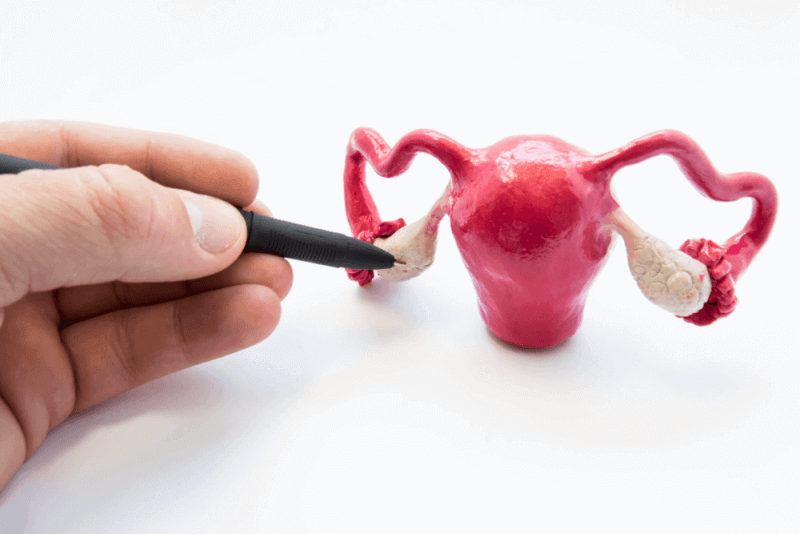What is Menstrual Delay?
A normal menstrual cycle (the time from the first day of your period to the first day of the next period) is typically 28 days. However, since this can vary from person to person, a normal cycle is considered to be between 21 and 35 days. If there is at least a 7-day delay in the menstrual cycle, this is defined as a menstrual delay.
Minor variations in the menstrual cycle are considered normal. Being a few days late or early is not considered a menstrual delay, but if this delay lasts more than 7 days, it is advisable to consult a doctor.
In young girls who have just started menstruating, ovulation may not yet be fully regularized, so menstrual irregularity is expected for about 1 to 1.5 years. For the menstrual cycle to function regularly, the system consisting of the hypothalamus, pituitary gland, ovaries, and uterus must work in harmony. Even a slight change in this system, even if not pathological, can alter the menstrual cycle.
How Many Days Can a Menstrual Delay Last?
A delay of a few days in menstrual bleeding is usually not a cause for concern. However, if the bleeding is delayed by a week or more, it could be due to pregnancy or an underlying medical condition.
A normal menstrual period lasts between 21 and 38 days. The period is counted from the first day of the previous menstrual bleeding. If menstrual bleeding is delayed by 7 days or more, it is considered a menstrual delay. However, if it lasts longer than 6 weeks, it is considered a missed period.
Diagnostic Criteria for Menstrual Delay
When a patient presents to the doctor with complaints of menstrual delay, a medical history is first taken. The duration of the menstrual cycle, the length of the bleeding, the amount of bleeding, and whether there is pain during menstruation are all questioned during the history taking.
In addition, whether the person has an active sexual life and whether they use contraception, if applicable, should also be questioned. A significant part of the history is the family history. Apart from these, regular medication use and menopause can also be questioned.
After taking the medical history, a gynecological examination is performed to check the uterus and ovaries. If necessary, after the gynecological examination, hormone tests such as estrogen, FSH, LH, and AMH, and a pregnancy test may be performed.
If an underlying disease is suspected, imaging techniques such as MRI may also be used. If it is thought that the cause of the menstrual irregularity could be a mass in the uterus or cervical cancer, a smear test may be performed. A biopsy may be taken from the uterus if necessary.
The hypothalamus, pituitary gland, uterus, and ovaries, which are the cornerstones of a healthy reproductive system and menstrual cycle, are thoroughly checked. The results of all examinations, laboratory tests, and evaluations are used to determine the cause of the menstrual irregularity.
What Causes Menstrual Delay?
Menstrual delay can occur due to minor physiological differences or as a symptom of a serious disease. Since there can be many different causes, the reason for menstrual irregularity must be investigated. Some causes of menstrual delay are as follows:
- Stress: Physical or emotional stress can disrupt hormonal balance and lead to menstrual delays. Particularly, anxiety, chronic depression, alcoholism, or substance abuse can also cause menstrual delay.
- Pregnancy: If the patient has an active sexual life and the menstrual period is delayed, a pregnancy test should be performed. Menstruation may stop during pregnancy, so the possibility of pregnancy should be evaluated.
- Hormonal Imbalances: Imbalances in hormones that play a significant role in the menstrual cycle, such as estrogen, progesterone, FSH, and LH, can also cause menstrual delay.
- Weight Disorders: Being underweight or overweight can disrupt body balance and lead to menstrual delay. Sudden weight gain or loss can have the same effect.
- Excessive Exercise: Excessive exercise affects the hypothalamus in the brain and can lead to menstrual delay. This condition can be seen in long-distance runners and ballerinas, for example.
- Early Menopause: Women typically enter menopause between the ages of 45-55. If a patient enters menopause before the age of 40, this is defined as early menopause and can cause menstrual delay.
- Medications or Diseases: Some medications or systemic diseases, such as diabetes or cancer, can also cause menstrual delay. The underlying condition causing the delay should be identified, and appropriate treatment should be provided.
Symptoms of Menstrual Delay
The symptoms of menstrual delay vary depending on the underlying cause.
- If the menstrual delay is due to pregnancy, pregnancy symptoms may appear. Nausea, vomiting, dizziness, weight gain, and the absence of menstruation may be observed.
- Fatigue
- Lower abdominal pain
- Back pain
- Sudden mood swings may be observed.
- If the menstrual delay is due to a disease, the symptoms of the disease may be observed along with the menstrual delay. Examinations, tests, and imaging methods are evaluated to determine the cause of the delay and treatment is planned accordingly.
Treatment Methods for Menstrual Delay
After a detailed examination of patients presenting with complaints of menstrual delay, a treatment method should be applied depending on the cause of the delay. Pregnancy, hormones, and physiological issues are investigated, and an appropriate treatment plan is created.
If the cause of the menstrual delay is related to the thyroid gland, medication is started, or if it is due to a condition like polycystic ovary syndrome, a proper diet is arranged, and if there is excess weight, a suitable diet plan is prepared.
In cases of menstrual delay due to a disease, treatment appropriate to the disease is applied. If there is no significant gynecological problem or disease;
- A balanced diet is maintained. Whole grains, fruits, vegetables, lean proteins, and healthy fats are consumed. Foods rich in iron, calcium, magnesium, and vitamins B and D are included to help maintain hormonal balance.
- Drink plenty of water to support the body's natural balance.
- Regular physical activity should be done to improve blood circulation and reduce menstrual cramps. Light exercises such as walking, yoga, swimming, or cycling can be performed.
- Stress management should be ensured. Stress can be reduced by practicing breathing exercises, meditation, and mindfulness, thereby improving hormonal balance.
- Quality sleep is important for the body's balance. Regular sleep also affects hormones and prevents menstrual delay. Aim to sleep 7-9 hours a day.
- Self-care practices during menstruation can also be beneficial for relaxation. Warm baths, light exercises, soothing herbal teas, and self-massage routines have a calming effect.
In Which Months Does Seasonal Menstrual Delay Occur?
Seasonal changes affect many mechanisms in the body, including the menstrual cycle. Seasonal transitions have an impact on metabolism and mood. It has been observed that the periods when sunlight decreases and increases can also change the length of the menstrual period.
It has been suggested that ovarian activity is higher in the summer. Sunlight helps increase the secretion of FSH, which regulates reproductive functions in the body. Therefore, menstrual delay is more common during the transition to winter. Lifestyle changes, physical inactivity, and changes in eating habits in winter also contribute to menstrual delay.
How Long Does Stress-Related Menstrual Delay Last?
When the hypothalamus and pituitary gland, which play a key role in the menstrual cycle, are affected by stress, menstrual delays may occur. Sudden traumas, intense sadness, depression, and anxiety in a person's life can disrupt hormonal balance and delay menstruation.
The duration of stress-related menstrual delay can vary from person to person. While a delay of a few days is generally experienced, this situation can last longer as stress levels increase.
How Long Does Menstrual Delay Last?
A delay of at least 7 days outside of a person's regular menstrual cycle is referred to as menstrual delay. It may take 1.5-2 years for ovulation to regularize in those who have just started menstruating. Irregularities in these individuals are considered normal.
Similarly, irregular and delayed menstrual cycles are normal in those who have entered menopause, as ovulation becomes infrequent. If a woman of reproductive age has a menstrual cycle delay of 7 days or more, it is not considered normal, and she is advised to consult a doctor.
Menstrual Delay and White Discharge
If there is a white discharge along with menstrual delay, it may be considered an early pregnancy. Vaginal discharge in early pregnancy is a thin, whitish discharge. If the discharge increases along with the menstrual delay, the likelihood of pregnancy increases.
If the white discharge is thick and resembles cottage cheese, it may indicate a vaginal yeast infection. Vaginal yeast infections can also cause menstrual delay. Discharge with a strong odor and a cottage cheese-like consistency can be treated with antibiotics.
What Causes Menstrual Delay Without Pregnancy?
Menstrual delay without pregnancy can generally be due to the following conditions:
- Stress
- Hormonal imbalances
- Poor diet
- Birth control pills
- Thyroid
- Polycystic ovary syndrome
- Breastfeeding
- Ovarian cysts and fibroids
- Cervical cancer
- Menopause
Which Antibiotics Cause Menstrual Delay?
One of the side effects of antibiotic use is menstrual delay. While it varies from person to person, antibiotics can cause menstrual delay in some women. Although not all antibiotics cause menstrual delay, some types can.
Some types of antibiotics, such as tetracyclines, macrolides, fluoroquinolones, sulfonamides, metronidazole, chloramphenicol, and rifampin, can affect the menstrual cycle in women, leading to menstrual delay. Patients experiencing menstrual delay may consult their doctor for medication changes.
What Helps with Menstrual Delay?
If menstrual delay is caused by a gynecological problem or disease, treatments administered by a doctor will be effective. Some methods that are effective for menstrual delay not caused by disease include:
- Practicing yoga and exercises that help relax the abdominal muscles
- Consuming foods rich in vitamin C
- Drinking herbal teas that help induce menstruation, such as chamomile, thyme, sage, rosemary, and cinnamon
- Practicing stress-relief techniques such as meditation and breathing exercises
- Consuming plenty of fruits and vegetables
- Taking warm showers
- Avoiding caffeinated and carbonated beverages
Menstrual Delay While Using Contraceptives
The likelihood of pregnancy is very low in women who have protected sex. The important point here is the method of contraception used. It is normal for a woman using birth control pills to experience menstrual delay. Especially birth control pills that contain only progesterone can cause menstrual delay. After stopping the pills, it is expected that the menstrual cycle will return to its normal pattern.
If hormonal intrauterine devices (IUDs) are used, they can also cause menstrual delay. However, in the case of copper IUDs, this is not the case, but menstrual delays can be observed during the first 3-6 months after the IUD is inserted.
IUD and Menstrual Delay
Can Menstrual Delay Occur with an IUD?
Menstrual delay can occur when using an IUD if a hormonal IUD is used. The hormonal IUD contains progesterone and works by releasing progesterone into the uterus. It is more effective than copper IUDs but can cause menstrual delay. Once the IUD is removed, menstrual delays usually return to normal.
What is the Effect of an IUD on Menstrual Delay?
There are some side effects of using an IUD. It is possible to experience irregular bleeding and cramps, especially in the first few months after insertion. On the other hand, in some women, menstrual bleeding may completely stop after the first few months. Therefore, it is possible that the use of an IUD can cause menstrual delay.
Do Fibroids Cause Menstrual Delay?
Fibroids are benign tumors in the uterus, and if the fibroid is located close to the cervix, it can cause menstrual delay by blocking the cervix. Since the cervix is blocked, the blood cannot flow out, causing menstrual delay. The menstrual blood that cannot come out from the cervix accumulates in the uterus and causes pain in the lower abdominal region.
Does Discharge Cause Menstrual Delay?
Normal discharge during the menstrual cycle in women is clear and odorless, resembling egg whites. If the color and odor of the discharge change, it may be indicative of an infection or yeast. Infections can also lead to menstrual delay.
Vaginal infections can be caused by many factors. Bacterial infections, yeast infections, parasites, or sexually transmitted infections can cause them. Infections cause inflammation in the vagina and surrounding tissues, which can lead to menstrual delay. If menstrual delay occurs along with discharge, it is essential to consult a doctor and receive appropriate treatment.
Do Morning-After Pills Cause Menstrual Delay?
Morning-after pills are used to prevent pregnancy after unprotected sex. They are not suitable for regular use and should be taken as soon as possible after unprotected sex. Due to their high hormone content, morning-after pills can cause menstrual delay.
They come in two types: those containing only progesterone and those containing both estrogen and progesterone. Morning-after pills that contain only progesterone are more effective. The most common side effect of these pills is menstrual irregularity. Menstrual delays may occur, and these irregularities can last for a few months.
Does Menstrual Delay Cause Abdominal Bloating?
Menstrual delay can cause symptoms in various organs in the body. Menstrual delay can lead to breast tenderness, headaches, fatigue, back pain, and bloating in the abdomen. Bloating associated with menstrual delay can be an important indicator of the underlying cause.
The Effect of Iron Deficiency on Menstrual Delay
There are many different types and causes of anemia, but the most common type in women is iron-deficiency anemia. This is especially common in women who have heavy menstrual bleeding regularly. Heavy menstrual periods can cause significant blood loss, leading to depleted iron stores and insufficient iron for new blood production.
Additionally, iron deficiency leads to a decrease in hemoglobin levels. Low hemoglobin levels reduce the blood's capacity to carry oxygen and affect overall blood circulation in the body. This can result in menstrual irregularities.















E** O** | 23 Mar 2025